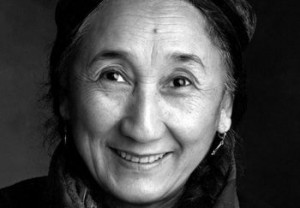The World Uyghur Congress Marks 11th Anniversary of Rebiya Kadeer’s Release from Prison
For immediate release
18 March 2016
Contact: World Uyghur Congress www.uyghurcongress.org
0049 (0) 89 5432 1999 or [email protected]
The World Uyghur Congress marks March 17, 2016, as the 11th anniversary of the WUC’s current president’s release from prison and relocation to the United States. Rebiya Kadeer remained in prison in China for five and a half years of an initial eight year sentence – and remains the only Uyghur prisoner released as a result of pressure from the international community. Ms. Kadeer’s efforts continue to propel the Uyghur Democracy Movement forward and inspires those that fight for justice and democracy in and out of China.
Her release represents the collective strength of the Uyghur people and the persistence exhibited when facing a strong adversary, but also illustrates the continued adversity that all Uyghur people face on a daily basis. Thousands of Uyghurs remain in prison on dubious charges, having been forced through an opaque legal system that effectively erases those that enter it.
Rebiya Kadeer, now 70 years old, has been a steadfast supporter of Uyghur rights and a major contributor to women’s rights in China as she founded the “Thousand Mothers Movement” in 1997, primarily as a means of promotion of female-specific job training and employment opportunities for women. Before that, she grew her own trading company and department store in Urumqi from scratch into a multi-million dollar business.
Initial support was given to Ms. Kadeer as she worked within the Chinese state system, but their relationship soured when she criticized the state’s treatment of Uyghurs during a National People’s Political Consultative Conference session in 1997 as well as the recent harsh crackdown on student protests in Ghulja which resulted in hundreds of fatalities.
Ms. Kadeer would subsequently be detained on August 11, 1999, on her way to a meeting with members of an American delegation of congressional staff. By March 10, 2000, the Urumqi People’s Court would sentence her to eight years in prison ostensibly for “illegally providing state intelligence abroad”. The charges were unfounded, with almost no judicial oversight in the ultimate decision – which has developed into an even more significant problem.
During her imprisonment, in 2000, Human Rights Watch honored Ms. Kadeer as a human rights monitor and in 2004, Norway’s Rafto Foundation honored her with the Rafto Award.
Ms. Kadeer’s eventual release was ultimately a product of widespread international efforts in opposition to the Chinese government’s attitude. The US government as well as the European Union were instrumental in consistently raising the issue to the international community through the passing of resolutions and writing of letters to Chinese government officials. Other international organizations, such as Amnesty International, also played a major role, alongside international Uyghur organizations that lobbied their respective governments against Ms. Kadeer’s detention.
Despite her release, Ms. Kadeer’s family has been a constant target of persecution by the Chinese government, especially since she relocated to the United States. One of her sons, Ablikim Abdiriyim, remains in prison on dubious charges, with credible evidence that he has been subjected to torture. Two other of Ms. Kadeer’s sons, Alim and Kahar were also sentenced to prison terms back in 2006. Such persecution has little to do with genuine crimes committed, but as retribution for her speaking out for justice and human rights.
Likewise, Uyghur academic, Ilham Tohti, remains in prison on a life term, despite strong calls from the international community for his release. His case is significant in that he was charged for “separatism” by the Chinese government, despite having never made public claims for the independence of the. His case must be seen within the context of a paranoid government that wishes to send a clear signal to those who wish to criticize state policy.
We must look to leaders like Rebiya Kadeer in these trying times as a beacon for what can be achieved if we are able to act together in solidarity. Her case provides hope for those that may feel they have none. Ms. Kadeer has since been steadfast in her activism and support of the Uyghur people as she continues to speak out to inspire change.
The international community must continue to come together to offer support for the promotion of human rights in East Turkestan. Dissent has been effectively curtailed within China, so there is little chance that change will be able to develop from within without support. We must all act together to pressure China to discontinue its harshly discriminatory policies so that true peace and stability may come to the region at last.


